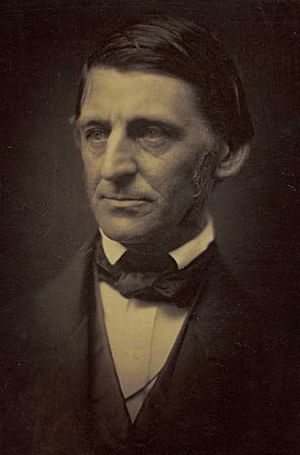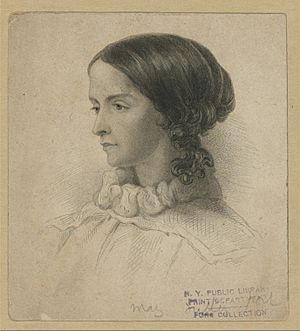Transcendentalism facts for kids
Transcendentalism was a special way of thinking that started in the late 1820s and 1830s in New England, a region in the United States. A main idea of Transcendentalism is that people and nature are naturally good. They believed that society and its rules sometimes make people less pure. But when people are truly "self-reliant" and independent, they are at their best.
Transcendentalists thought that spiritual experiences could be found in everyday life, not just in a faraway heaven. They saw physical and spiritual things as part of a flowing process, not separate items. This movement was one of the first big ideas to come from the United States. It's an important part of American philosophy.
Transcendentalists believed that people could have new and original ideas by trusting their own feelings and thoughts, rather than just following old teachings. This way of thinking began as a protest against the common ideas and spiritual beliefs of the time. It was also connected to the Unitarian church's teachings at Harvard Divinity School. Transcendentalism was influenced by ideas from English and German Romanticism, and from thinkers like Immanuel Kant. It was also strongly shaped by Hindu texts, especially the Upanishads.
Contents
How Transcendentalism Started
Transcendentalism is closely linked to Unitarianism, a religious movement in Boston in the early 1800s. It began to grow after Unitarian ideas became popular at Harvard University. This happened when Henry Ware became a professor in 1805 and John Thornton Kirkland became President in 1810.
Transcendentalism didn't reject Unitarianism. Instead, it grew naturally from the Unitarian idea of free thought and the importance of reason. However, Transcendentalists wanted a deeper and more exciting spiritual experience than what Unitarianism offered. So, Transcendentalism wasn't against Unitarianism, but rather a new step in the same direction.
The Transcendental Club

Transcendentalism became a clear movement when the Transcendental Club was formed. This club started in Cambridge, Massachusetts, on September 12, 1836. Important thinkers from New England, like Ralph Waldo Emerson and Frederic Henry Hedge, were part of it.
Other members included Amos Bronson Alcott, Henry David Thoreau, Margaret Fuller, and Elizabeth Peabody. From 1840, the group often shared their ideas in their own journal called The Dial, as well as in other places.
What Transcendentalists Believed
Transcendentalists strongly believed in the power of each person. They cared a lot about personal freedom. Their ideas were similar to those of the Romantics. However, Transcendentalists also tried to accept or at least not oppose scientific facts.
Inner Knowledge
Transcendentalists wanted their religion and philosophy to be based on principles from German Romanticism. They combined ideas from English and German Romanticism, and from thinkers like Immanuel Kant. They believed that people have a special kind of knowledge that comes from within themselves. Early Transcendentalists learned about German philosophy mostly from English and French writers. The Transcendental movement can be seen as an American version of English Romanticism.
Importance of the Individual
Transcendentalists believed that society and its rules, especially organized religion and political groups, can make people less pure. They had faith that people are at their best when they are truly independent and rely on themselves. They thought that a real community could only be formed by such independent individuals.
Even with this focus on individuality, Transcendentalists also believed that all people are connected to something called the "Over-Soul". Because the Over-Soul is one, it connects all people as one being. Ralph Waldo Emerson mentioned this idea in his speech American Scholar. He said that there is "One Man" that is partly present in all people. This means that each person has a piece of the divine Over-Soul inside them.
Influence of Indian Religions
Transcendentalism was rooted in Western philosophical traditions like Platonism. But it was also directly influenced by Indian religions. Henry David Thoreau wrote about this influence in his book Walden.
He said he would "bathe my intellect in the stupendous and cosmogonal philosophy of the Bhagavat Geeta". He felt that this ancient Indian text made the modern world seem small. He also wrote about meeting a servant of a Brahmin priest from India, drawing water from the same well. This showed how he felt connected to these ancient traditions. In 1844, the first English translation of the Lotus Sutra was published in The Dial, the Transcendentalist journal.
Love for Nature
Transcendentalists deeply valued and appreciated nature. They loved it not just for its beauty, but also as a way to learn about the natural world. Emerson highlighted this belief in his essay Nature:
In the woods, we return to reason and faith. There I feel that nothing can befall me in life, — no disgrace, no calamity, (leaving me my eyes,) which nature cannot repair. Standing on the bare ground, — my head bathed by the blithe air, and uplifted into infinite space, — all mean egotism vanishes. I become a transparent eye-ball; I am nothing; I see all; the currents of the Universal Being circulate through me; I am part or particle of God.
Protecting nature was also very important to Transcendentalists. Their belief in idealism made them question things like capitalism, westward expansion, and industrialization. For example, Margaret Fuller noticed in 1843 that "the noble trees are gone already from this island to feed this caldron." In 1854, Henry David Thoreau described trains as a "winged horse or fiery dragon" that spread people and goods across the country.
How Transcendentalism Influenced Others
Transcendentalism is seen as the first important American intellectual movement. It inspired many later generations of American thinkers and writers.
Transcendentalism influenced the "Mental Sciences" movement in the mid-1800s, which later became known as the New Thought movement. New Thought thinkers consider Ralph Waldo Emerson their main inspiration. Many founders of New Thought churches and groups, like Emma Curtis Hopkins and Charles and Myrtle Fillmore, were greatly influenced by Transcendentalism.
Transcendentalism was also influenced by Hinduism. Ram Mohan Roy, who founded the Brahmo Samaj in India, found that Unitarianism was similar to his beliefs. He had strong ties to the Unitarians, who were close to the Transcendentalists. After Roy's death, the Brahmo Samaj kept close connections with the Unitarian Church. This church worked towards a reasonable faith and social improvements.
Main People in Transcendentalism

The most famous figures in the Transcendentalist movement were Ralph Waldo Emerson, Henry David Thoreau, Margaret Fuller, and Amos Bronson Alcott. Other important Transcendentalists included Louisa May Alcott, William Henry Channing, James Freeman Clarke, Elizabeth Palmer Peabody, and Walt Whitman.
Criticism of the Movement
When the movement was new, the word "Transcendentalists" was sometimes used by critics to make fun of them. These critics suggested that the Transcendentalists' ideas were beyond normal thinking or reason.
Nathaniel Hawthorne wrote a novel called The Blithedale Romance (1852) that made fun of the movement. He based it on his own experiences at Brook Farm, a short-lived community that tried to live by Transcendentalist ideas.
Edgar Allan Poe also wrote a story called "Never Bet the Devil Your Head" (1841). In it, he showed his strong dislike for Transcendentalism. He called its followers "Frogpondians" and made fun of their writings, saying they were full of "mysticism for mysticism's sake." He even called it a "disease."
See also
 In Spanish: Trascendentalismo para niños
In Spanish: Trascendentalismo para niños
 | Leon Lynch |
 | Milton P. Webster |
 | Ferdinand Smith |

